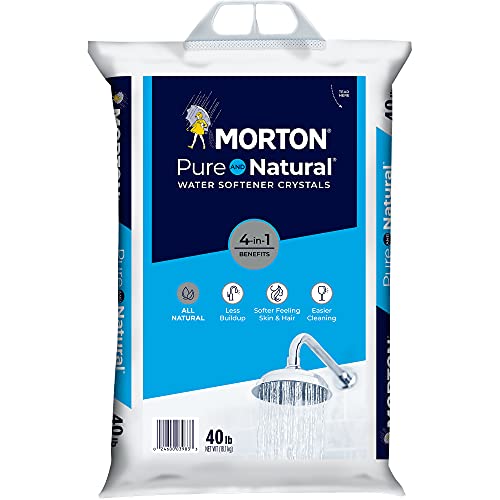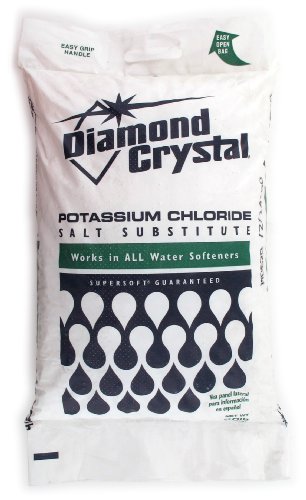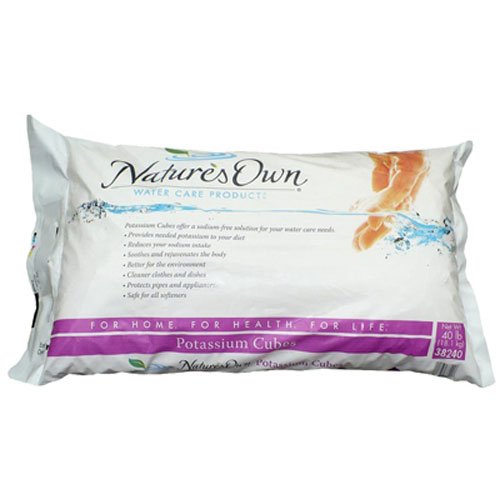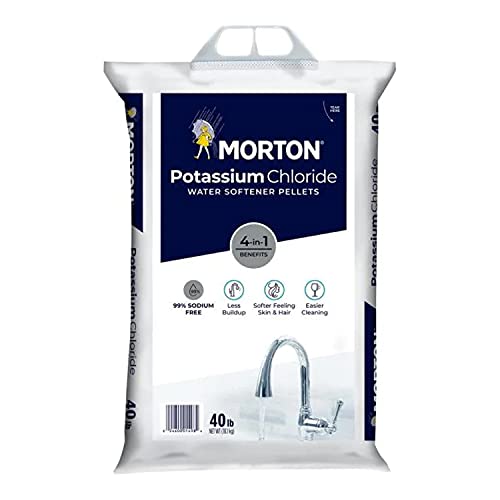Do you know…
Table Of Contents
−- Best water softener salt for sensitive skin:
- Morton Rust Defense F124700000g
- 1501 Morton Clean and Protect
- Water Softening Crystals Morton U26624S
- Cargill Salt 7304 Water Softener Salt
- Diamond Crystal Water Softener
- Diamond Crystal Iron Fighter Pellets
- Diamond Crystal Bright and Soft Series
- 38240 Nature’s Own Potassium Solution
- Morton Potassium Chloride Pellets
- Unlocking the Secrets of Healthy Skin: The Vital Role of Water Softeners
- Why Opt for a Water Softener?
- How Does a Water Softener Work?
- Choosing an Effective Water Softener Salt
- Reaping the Benefits of Soft Water for Sensitive Skin
- Deciphering Water Softeners: A Comprehensive Guide for Sensitive Skin
- Frequently Asked Questions
Hard water is present in 85 percent of American households,wa implies that you will most likely be affected by hard water concerns.
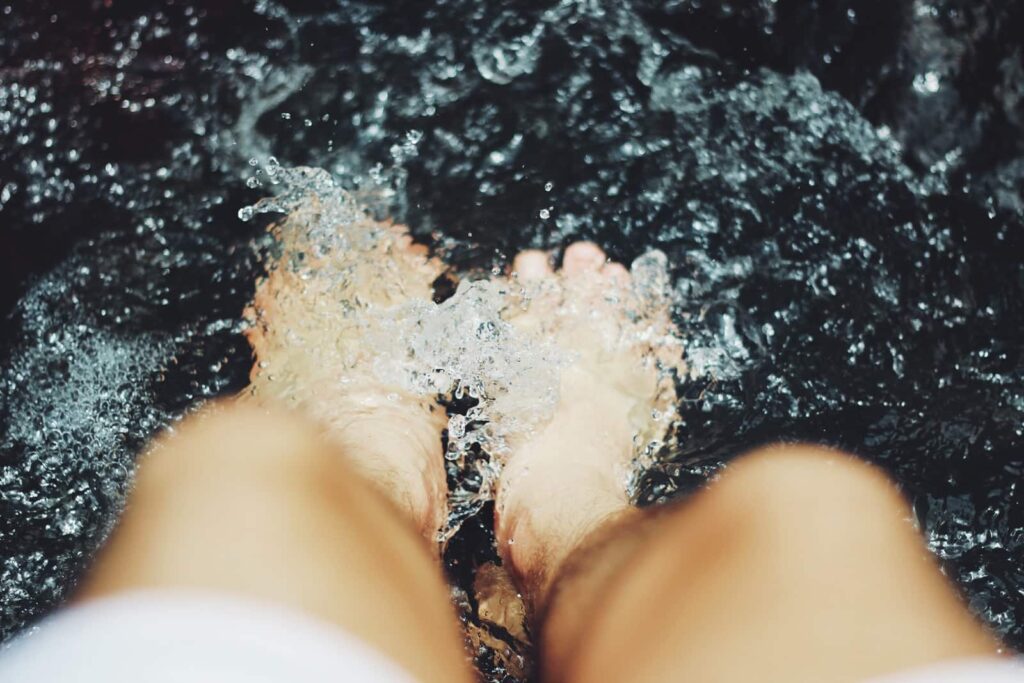
To assist you with your quest, we’ve compiled a selection of the top water softener salts that many users have commended and that we’re confident you’ll enjoy.
Nothing is more vital than having good skin. Because good skin makes you look lovely and young. And if you have sensitive skin, everything is difficult for you. As a result, your options for purchasing cosmetics become more limited.
But have you considered that the water in your home is potentially harmful to your delicate skin? Yes, even if you have a water softener, this is a harsh reality. But don’t panic; all you need to do is get the best water softener salt for sensitive skin, and you’ll no longer have to deal with rough water. Choose the best option for you from the list below.
| EDITOR’S CHOICE | 2ND PICK | 3RD PICK | |
|---|---|---|---|
| Morton Rust Defense | 1501 Morton Clean and Protect | Crystals Morton U26624S | |
| Ratings | |||
| Weight | 40 lbs | 50 lbs | 40 lbs |
| Pellets/Crystals | Pellets | Pellets | Crystals |
| NSF Certified | Yes | Yes | Yes |
| CHECK PRICE | CHECK PRICE |
Best water softener salt for sensitive skin:
A softener works hard to soften the water, so it is gentle on your skin. However, if you do not use skin-friendly water softener salt, your efforts to lessen skin sensitivity will be a waste of time and money. There will be no such advantages from employing expensive cosmetics and beauty treatments. So, choose prudently from the list below.
The following are the top water softener salts for sensitive skin:
Morton Rust Defense F124700000g
Iron harms the skin. When your skin is sensitive, you should use a water softener salt to assist your water softening system in entirely removing the iron from the water. As a result, Morton has developed a comprehensive rust defense salt to meet your water treatment needs in the fight against rust. See the image to see how the pack appears.
With a 5-in-1 system, Clean & Protect/Rust Defense ups the ante. It offers the same quality and benefits as Morton’s Soft & Natural product, but with the extra benefit of built-in rust protection. The particle formation is what distinguishes this water softener. Larger salt crystals are created during Clean & Protect/Rust Defense manufacturing.
Packaging:
Heavyweight objects must be handled with care because sensitive skin necessitates it. Regarding the plastic handle, Morton is also concerned about your skin. This allows you to easily lift the bag and pour the salt into the softener.
Compatibility:
The Morton f124700000g is beneficial to your skin since it can remove 15 times more iron than any other water softener salt. As a result, your sensitive skin will now be smoother, with no red spots.
Weight:
- Because the pack of sodium chloride salt weighs 40 pounds, it is preferable if the seller ships it to your door.
Pros
- Aids in the prevention of rust formation on appliances and clothing.
- Very good package.
- Water with a strong flavor.
- Ideal for relatively hard water.
- Compatibility with standard water softener equipment or systems
- Solar salt of the highest purity
- Purchases are widely available.
- For older homes with iron pipes, this is a good option.
Cons
- For some of you, the bag may be a little heavier.
- a little more expensive than some competitors
Morton suggests using two bags of these Pure and Natural water softener crystals every two months. Furthermore, you must keep your unit’s salt container half full. There is no need to be concerned about a consistent supply because this product is widely available in various supply stores to replace your cache at any moment.
1501 Morton Clean and Protect
Morton System Saver II was always the finest choice for sensitive skin. However, some are concerned because the manufacturer has ceased production. But there is some good news for you if you look for it. It is now known as ‘Morton Clean and Protect.’ See the table below for more information on your skin-friendly salt.
Packaging:
Sensitive skin necessitates the ease of handling heavy goods. So there’s no need to be concerned because there’s a convenient open tab on the top of the pack. There will also be simple handling, transporting, and pouring.
Compatibility:
It extends the life and efficiency of your water softener, water heater, and other electric equipment. In addition, the water is gentler on the skin and hair.
Weight:
The weight of this Morton salt 1501 clean protect system is 50 pounds. As a result, it is preferable to have it delivered to your door.
Pros
- Since 2005, I have strongly recommended this product.
- Patented with a one-year warranty
- Good Housekeeping has given their approval!
- Compatibility with standard water softener equipment or systems
- Phosphate-free aids in the removal of iron
- Packaging that is both convenient and sturdy
- Purchases are widely available.
- Simple to use and handle
- Enhances the efficiency of water-related appliances
- The brine tank does not need to be cleaned regularly.
- Produced in the United States
Cons
- Some users thought this product was a tad costly.
- Heavy bag
- When purchased online, the price is two times greater.
- Only a 50lb bag size is available.
- Consumers were confused as a result of the name change.
Water Softening Crystals Morton U26624S
We’ve added another Morton salt product to our list since they never cease to amaze us. These natural water-softening salt crystals have a lot going for them. Therefore, they are slightly more expensive, but we believe they are well worth it.
Morton Pure & Natural Water Softening Crystals contain solar salt crystals of the highest purity. This one-of-a-kind water softener results from a combination of sun, wind, and time. Morton’s softening crystals ensure rapid distribution in water softening systems, resulting in softer water sooner and a cleaner, purer taste. The 4-in-1 technique is all-natural, reduces build-up, softens skin and hair, and makes cleaning easier.
Compatibility:
These salt water softener crystals are created from pure grade sodium chloride and result from sun processing. This product is ideal if you’re looking for a natural remedy for hard water up to a moderate level of hardness.
Packaging:
Morton has thought of everything, including the packaging for this product. Morton’s pure and natural water softening crystals come in an easy-to-lift, carry and pour bag. Morton outperforms once more when it comes to packaging, with a robust, durable material that is easy to carry thanks to its handle. You can quickly tear open the bag and pour the salt crystals into the brine tank of your water softener, reducing the chance of spillage.
Compatibility:
These salt water softener crystals are created from pure grade sodium chloride and result from sun processing. This product is ideal if you’re looking for a natural remedy for hard water up to a moderate level of hardness.
Usage:
This is very dependent on your water softener and water usage, but Morton suggests using two bags of this water softener salt every two months. Fortunately, these water softener salt crystals are commonly available, so you won’t have trouble finding more when you need it.
Pros
- Simple to use
- Natural sodium chloride salt of high purity
- Aids in the lather of soaps and detergents
- Prevent the accumulation of scale in water appliances.
- Rust accumulation is reduced.
- Improves and softens the feel of hair and skin.
- The product is completely natural.
Cons
- A little sulfur odor may be introduced into the water.
- After using this solution, some customers experienced a sulfur odor in their water.
- A little overpriced
Morton suggests using two bags of these Pure and Natural water softener crystals every two months. Furthermore, you must keep your unit’s salt container half full. There is no need to be concerned about a consistent supply because this product is widely available in various supply stores to replace your cache at any moment.
Cargill Salt 7304 Water Softener Salt
Cargill is another major participant in the area of water softeners and water filters, and they are unquestionably a reliable name.
Nothing is naturally white and milky than Cargill’s water softener salt crystals. The brand’s water softener is 99.9 percent pure and distilled using wind evaporation and solar power.
Compatibility:
This is one of the greatest water softener salt options in terms of compatibility. It is NSF approved and works with all common water softener systems, so you can be confident that it is safe to use. Furthermore, it is compatible with household and commercial salt-based water softening systems.
Ingredients:
Cargill strongly emphasizes natural procedures and high-purity components, such as these natural water softening crystals, which are 99.9 percent pure. It is subjected to wind evaporation and solar power to distill it into its final form. This makes the salt incredibly efficient and safe for food and drink. Therefore look for solar salt or evaporated salt whenever possible.
Packaging:
They’ve wrapped this softener salt in a polythene bag to keep it safe from moisture and damage, so you can store it safely, knowing it won’t spoil or leak.
Pros
- Compatibility with standard water softener equipment or systems
- Natural procedure
- There is minimal residual.
- NSF approved
- Polyethylene bags are used to safeguard the product.
- It is compatible with the vast majority of typical water softening systems.
- Environmentally friendly and aids in the production of better-tasting water
- This natural salt is packaged securely.
Cons
- It is slightly more expensive than other types of water softener salt.
- more costly than some competitors on the market
The Cargill Salt 7304 water softener is the best option for moderately hard water. It is also suitable for a family of reasonable size. You may enjoy that piece of mind throughout the house. You’re merely employing natural mechanisms to soften your hard water. There are no substances that can soften it while also affecting the health of your loved ones.
One thing that may cause you to second-guess is the price of Cargill’s water softener salt, which is slightly higher than the price of other water softeners. On the other hand, this product is a wonderful investment because it is superb and receives five stars for performance. The crystals melt faster, and there are no bridges to worry about. It is an excellent addition to your household necessities.
Diamond Crystal Water Softener
If you don’t want too much salt in your water, this is undoubtedly the finest option for you. Because it employs potassium chloride, Diamond Crystal’s Potassium Chloride is the ideal salt alternative. It’s a low-sodium substitute for standard salt-based water softeners.
It is made up of 99.1% pure potassium chloride. It is also quite compatible with the majority of water softening systems. This is an excellent choice because you can use softened water for indoor and outdoor plants and animals. It should be noted that potassium chloride still contains salt but at a lesser concentration. This is also the greatest option for those in the home who are sensitive to salt or need to keep a tight eye on their salt intake.
Ingredients:
As previously stated, this product contains 99.1 percent potassium chloride, making it suitable for most water softener systems, giving softened water for indoor and outdoor use.
Packaging:
Diamond Crystal has made the packaging lightweight and portable, allowing you to move it without fear of leakage. It is simple to open and will be well protected from the elements, which is an extra plus. You’d like the bag to be user-friendly and simple to open. Its carrying handle is also made of strong material, so moving and carrying it will be a breeze.
Performance:
It has the 16,000-grain capacity you’d expect from a portable water softener. Furthermore, it will ensure that your water source is free of hazardous minerals like calcium and magnesium and lead, iron, and other heavy metals. This is especially useful for untreated water sources, including well water. It also has a flow rate of 5 gallons per minute, which is more than enough for most consumers.
Pros
- Most water softener equipment or systems are compatible with this product.
- Reduced salt content
- Water that has been processed is safe to use on plants and animals.
- Improved laundry outcomes
- It contributes to the longevity of your water fixtures.
- This product is compatible with most salt-based water softening systems on the market.
- A wonderful substitute for sodium-based water softeners.
- It contributes to the longevity of pipes and appliances.
Cons
- Cost and use have both increased.
- You will need to utilize more than a sodium salt softener, raising operating costs.
Diamond Crystal Iron Fighter Pellets
Hard water and iron are two of the most common problems homeowners face, regardless of their water supply. Iron can be found in city and well water, with the same annoying and troublesome outcomes.
When you detect rust spots, you know your water source contains iron. Diamond Crystal Iron Fighter Pellets are designed and produced to give a remedy for iron-rich water. It’s also worth noting that this product is FDA-approved as a rust remover.
Not only does it cure hard water well, but it also addresses the issue of high iron levels in your water supply, making it one of the finest water softener salt for sensitive skin products. This implies that Diamond Crystal has created yet another wonderful solution for its consumers who require softened water.
Compatibility:
It is compatible with all of the common salt-based water softeners used in homes, so you are unlikely to need to upgrade or replace your current system. In addition, it is almost entirely soluble. Thus it will assist avoid bridging and mushing in your brine tank, ensuring that it performs properly and ultimately protecting water softener systems. This is one of the advantages of having it in pellet form.
Performance:
These Iron Fight Sodium Chloride Pellets are created from 99.7% pure salt and target rust stains typically observed on pipes and faucets, which are caused by iron. They have been FDA-approved as food-grade salt and are also NSF certified, so you can be confident that they will do the job properly and give clean drinking water.
Packaging:
Diamond Crystal water softener has also taken care with its packaging, employing a polybag made of 50 percent recycled materials, reducing the environmental impact. It also includes two handles for easy carrying, lifting, and pouring.
Pros
- Compatibility with standard water softener equipment or systems
- 7 percent regular pure salt
- NSF/ANSI/CAN Standard 60 certified NSF/ANSI/CAN Standard 60 certified 100 percent soluble
- This salt is compatible with the market’s most common water softening systems.
- This solution removes iron from your water supply, which is especially important for individuals who have well water and wish to avoid rust and water spots.
Cons
- A little costly
- You will need to utilize more than a sodium salt softener, raising operating costs.
Diamond Crystal Bright and Soft Series
These water softener salt pellets truly live up to their name, keeping your pipes, faucets, fixtures, and fittings in pristine condition. This is due to how soft your water will get after using this product. Another good performance may be slightly more expensive than the average, but it is clear why.
Ingredients:
These water softener pellets are created from 99.8 percent pure salt, the purest and most natural water softening salt available. This purity will aid in transforming the water you use, protecting your family and your home from the damage that hard water may cause.
Performance:
It will aid in preventing limescale since it employs the ion exchange process to replace hard water-causing minerals such as calcium, magnesium, and iron with sodium ions. As a result, you will notice that your pipes run more efficiently, your appliances last longer, and you will spend less time cleaning while enjoying softer water on your skin.
Packaging:
These water softener pellets have been placed in a strong bag to keep them safe throughout delivery. While this makes it very large, the two handles make it simple to lift and pour into your brine tank.
Pros
- Organic gathering in its natural state
- More minerals are removed with the pellet formula.
- Purity of 99.8 percent
- Compatibility with standard water softener equipment or systems
- 8 percent regular pure salt
- Iron is removed from your water.
- NSF-certified packaging that is both practical and smart
Cons
- Not suitable for all water-softening systems.
- Only 50lb bags are available.
- Online prices and shipping are three times greater than in-store prices.
- It is slightly more expensive than other salt pellets.
38240 Nature’s Own Potassium Solution
Water containing sodium chloride might also cause irritated skin. In that scenario, a potassium solution for your water softener is required. Nature’s Own offers the finest value for money among all other solutions on the market. It softens the water without adding salt. As a result, the skin will feel healthier as well. Learn more about it in the sections below.
Potassium chloride successfully eliminates magnesium and calcium from well water, but it also has an added benefit if you are on a city water source that is extensively chlorinated.
To destroy germs and protozoa, chlorine is added to municipal water systems. Unfortunately, some water supplies require so much chlorine that the water loses quality, sometimes tasting like you’re drinking from a public swimming pool.
Compatibility:
It improves any water softener’s ability to remove all hardness from water. It also lasts longer, so you won’t have to worry about buying more salt for your brine tank at regular intervals.
Weight:
The bag’s 40-pound weight necessitates shipping to the house. So don’t bother buying it and transporting it yourself.
Packaging:
The package is both long-lasting and simple to use.
Pros
- Your water will taste better as a result.
- It is less harsh on the hair and skin than sodium chloride solutions.
Cons
- If you put more than the recommended amount, it may cause clogging.
Morton Potassium Chloride Pellets
Another potassium chloride solution has been added to our list for clients who prefer not to have extra sodium in their water. An intriguing design that provides the performance you’d expect from water softener salt while also being more efficient.
Potassium Chloride, in the form of Morton pellets, can lower the chlorine content in your water by up to 20%, making it much more pleasant to drink and eliminating the chlorine odor typical in some city water systems.
Performance:
As one of the leading brands of water softeners, you can rely on them to deliver, and this sodium-free version does not disappoint. It is 99 percent pure potassium chloride, and you will notice a significant reduction in scale build-up, allowing your water to flow more efficiently and preventing costly maintenance and appliance replacements down the road.
Weight:
Because of their superior quality and efficiency, these water softening system pellets come in a 40lb bag that should last about a month for the average household.
Efficiency:
According to reports, customers will experience a 20% reduction in chloride output compared to salt-based water softening pellets or any other sodium chloride product. This implies that less water is needed to regenerate the water softening system, which protects the environment while saving money.
Pros
- A high-quality potassium chloride-based Morton salt substitute.
- It is incredibly efficient, with a potential 20% reduction in chloride discharge, which means less water is required, and less waste is generated.
- It is 99 percent sodium-free, making it far healthier than salt pellets.
Cons
- Compared to Morton salt pellets, potassium chloride products are frequently slightly more expensive.
Unlocking the Secrets of Healthy Skin: The Vital Role of Water Softeners
As an authority in the realm of skin health, we recognize that water quality is a pivotal aspect, particularly for individuals with sensitive skin. Minerals such as calcium and magnesium, commonly found in hard water, can interfere with the skin’s natural barrier, potentially worsening existing skin conditions. That’s where the power of a water softener comes into play.
Why Opt for a Water Softener?
Hard water can interact with the fatty acids in your everyday soap or shampoo, generating chemicals that stick to your skin. Over time, this residue can clog your pores, thereby intensifying skin issues like acne, eczema, and dermatitis. For those with sensitive skin, chronic conditions like psoriasis or eczema could be further irritated by continuous exposure to hard water. Thus, using a water softener to eradicate these hard minerals can be a skin-saving strategy.
How Does a Water Softener Work?
Water softeners function by swapping out hard minerals in the water with sodium ions. This procedure, known as ion exchange, involves passing hard water through a media bed, generally a tank brimming with small resin beads saturated with sodium ions. As the water filters through this bed, the resin beads magnetize the hard minerals, releasing sodium ions into the water in return.
Choosing an Effective Water Softener Salt
In your journey towards soft water, choosing the right water softener salt is crucial. Factors such as purity, type, and form should influence your choice. The salt should boast at least 99% sodium chloride, as the water softening process relies heavily on this.
You’ll find various types of salts in the market – rock salt, potassium chloride, solar salt, block salt, and evaporated salt. Each type has different sodium chloride levels, with evaporated salt having the highest concentration, up to 99.99%. The form of the salt, be it pellets or crystals, can also impact the softening process.
Reaping the Benefits of Soft Water for Sensitive Skin
Soft water is less likely to leave residue on your skin, ensuring it feels cleaner and smoother. If your skin dramatically improves when you travel, your home’s water might be the culprit. By installing a water softener at home, you can experience these benefits daily, potentially alleviating skin irritations caused by hard water. For individuals with sensitive skin, this could significantly transform their skincare routine and overall skin health.
Deciphering Water Softeners: A Comprehensive Guide for Sensitive Skin
Navigating the world of water softeners can be complex, especially when considering the impact on sensitive skin. One key player in this process is water softener salt. This guide will simplify everything you need to know about water softener salts, equipping you to choose the right one for your needs.
The Role of Water Softener Salts in Softening Water
A water softener employs resin beads to filter out hard minerals from your water. These beads eventually become saturated with minerals and need a cleanse, a process known as regeneration or brining. That’s where water softener salt enters the scene. It’s used in a salt-brine solution to cleanse the beads of hard minerals.
Given the crucial role of water softener salts, it’s imperative to choose a type compatible with your water softening system. With a plethora of salts available, selecting the right one can be daunting. But don’t worry, we’re here to help!
Decoding the Types of Water Softener Salt
Water softener salts come in various forms, including rock salt, sea or solar salt, evaporated salt, and potassium chloride. The type you choose depends largely on your specific needs and preferences.
Rock salt, being widely available, is the most cost-effective choice. However, if you’re prioritizing the effectiveness of the salt, evaporated salt or sea salt might be better alternatives. If you’re looking to avoid using salt entirely, potassium chloride could be your perfect fit.
Crystal vs. Pellet: Understanding the Form
Water softener salts also vary in form – you’ll find them as crystals and pellets. Softener crystals, typically made from sea or solar salt, are compact and dissolve quickly, minimizing the risk of buildup. These are ideal for homes with low water usage and two-part water softening systems.
In contrast, softener pellets can be derived from any salt type, often based on evaporated salts. Some pellets even include additional ingredients that can prolong the life of your pipes and plumbing systems. These are suitable for medium to high water usage households and all-in-one water softening systems.
Maintenance Matters
The type of salt you choose will also influence how you maintain your water softener’s brine tank. Some salts, like rock salt, can leave a significant residue, requiring more frequent cleanings. Thus, understanding these differences is crucial for the proper upkeep of your water softener.
Diving Deeper: Water Softener Salt Varieties
Choosing the right chemical component can be confusing. Let’s delve deeper into the forms of salt and their unique characteristics:
Sodium Chloride Salts
Sodium chloride-based salts come in four forms:
- Rock Salt: Extracted from the earth, rock salt has a high impurity content. While affordable, its use can lead to residue buildup in the brine tank. Due to its high contaminant level, we don’t generally recommend this type.
- Solar Salt: Produced by the natural evaporation of seawater, solar salt is one of the purest forms of salt, available in both crystal and pellet form. However, it might not be the best choice for areas with extremely hard water.
- Evaporated Salt: This is the purest form of salt among all types of water softener salts. Despite being pricier due to its low contaminant content, it enhances the efficiency of the water softening system.
- Block Salt: While not typically recommended for water softening systems, in some cases, plumbers might suggest it. If used, ensure the block is fully submerged in water.
Potassium Chloride Salts
Potassium chloride salts are an alternative to sodium chloride salts. The main advantage of potassium-based salts is that they do not add sodium to the softened water, making them ideal for people on sodium-restricted diets. However, they are typically more expensive and less effective than sodium-based salts.
In the end, unless you have a specific restriction against sodium, we recommend sodium-based salt pellets for your water softener. If reducing chlorine and other chemicals is a concern, then potassium is the preferable choice.
Frequently Asked Questions
How Do I Use Water Softener Salt?
Before adding water softener salt, check the salt level in your water softener. If the salt reservoir is less than half full, add salt until it’s more than half full. Ensure the tank is always more than 25-33% full for your water softener to function effectively.
Remember, the salt level should always be about 3-4 inches above the water level. For a four-member household dealing with water hardness of 10 gpg, around 40 lb of water softener salt per month is recommended.
Does Water Softener Salt Affect My Skin?
Water softeners infuse water with minerals, which can be unfriendly to sensitive or delicate skin. Therefore, it’s important to choose wisely.
Sodium Chloride or Potassium Chloride: Which Is Better for Sensitive Skin?
The answer to this depends on your skin type. If you’re sensitive to salt, go for potassium chloride. If your sensitivity isn’t due to salt, sodium chloride is an option.
Can I Use Food-Grade Salt as a Water Softener?
While technically possible, using cooking salt is not advised. Cooking salt can have a high contaminant level that could harm the water softener. We strongly recommend using salt specifically designed for water softeners.
Can Water Softener Salt Irritate My Skin?
Yes, water softener salt can cause dermatitis flare-ups in some people. While protective gloves can prevent direct contact with the skin during the loading process, salt-treated water can still cause issues for those with extremely sensitive skin.
Why Does My Water Softener Make My Skin Itch?
Water softening removes hard minerals like calcium and magnesium from water, but it might still irritate sensitive skin. This could be due to the chlorine content in the water, similar to the itchiness from an overly chlorinated swimming pool.
The solution is to use the most soluble water-softening salt or pellet as recommended by the manufacturer. The purer the water, the less irritating it will be for your skin.
In conclusion, understanding your water softening system and the right type of salt to use is crucial for maintaining soft water in your home, particularly for those with sensitive skin. We hope this guide has provided you with the knowledge to make the best choice for your water softening needs!

Jay
Jay is a health and wellness enthusiast with expertise in water quality and nutrition. As a knowledgeable advocate for holistic well-being, Jay successfully manages Type 2 Diabetes through informed lifestyle choices. Committed to sharing reliable and authoritative insights, Jay combines firsthand experience with a passion for enhancing health."




